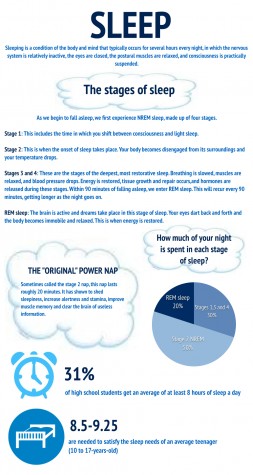
Sleep is important for teenagers to help them develop and grow.
Sleep Scenario:
After a long day of school and extracurricular activities, it’s already dark outside when you get home. Before you can start your homework, your stomach demands that you get something to eat.
By the time you actually start studying, you can barely keep your eyelids open. All you want is to lie down, close your eyes, and go to sleep.
Sleeping is a nice escape from reality — it’s where you can finally find a second to breathe. But, the constantly-recommended eight hours of it?
Yeah right. Count up all the hours that are consumed by school, homework, sports, jobs, and personal responsibilities. Your sleep schedule probably amounts to half of that.
While you may think you can simply power through the week and catch up on sleep when the weekend comes, your body strongly disagrees.
In an online article from Everyday Health, M. Safwan Badr, MD, president of the American Academy of Sleep Medicine and chief of the division of pulmonary, critical care, and sleep medicine at Wayne State University School of Medicine, said, “There’s really no free lunch when it comes to sleep deprivation. You are supposed to sleep seven to eight hours a night. That’s just a fact of life.”
In a recent poll of 151 students conducted by the Carlmont Journalism Department, 37 percent said that not getting enough sleep affects them to the point that they cannot focus in class.
“[Not having enough sleep] affects me in school because it is really hard for me to focus in class when I don’t get enough sleep. I do not think I perform as well in class when I haven’t slept enough the night before,” said senior Monica Bay.
Without the proper amount of sleep, students find themselves struggling on a daily basis to keep their eyes open.
Solution:
Know that naps aren’t just for toddlers.
If you need a moment to catch up on a few hours of sleep, the National Sleep Foundation suggests to take a nap during the day so you don’t throw off your biological sleep rhythms at night. They should be in the early afternoon and last around 20 to 30 minutes.
When it comes to schoolwork, you shouldn’t be sacrificing your health to avoid a late grade on homework. Both are important, but if sleep is being sacrificed too often, talk to your teacher and see if you can work out the issue.

Some of the top colleges in the country are going to be attended by Carlmont seniors
Frantic for the future:
Time waits for no one, and right now, it is a second-semester senior’s worst nightmare.
Trying to decide where you want to spend the next four years in college can be a timely process that requires a lot of thought.
When you finally decide where you are going, a new anxiety kicks in — keeping in touch with the people that are close to you.
It can be hard to keep your circle of friends alive when everyone is branching out in different directions.
“I am a little worried about maintaining friendships when everyone goes off to college because I feel like since I won’t see any of my friends on a daily basis and that we will all be so busy, it will be a lot harder to stay in touch,” said Bay. “But, I think that if your friendship really matters to you, then you should be able to keep in touch.”
Don’t forget about your career path either.
Colleges love to know that you have everything planned out. Some colleges do not allow you to change your major once you enroll, and others do not offer the avenue of entering undecided on a major.
All of this stress can make it easy for students to lose motivation during these last several months of school.
“I’m nervous for everything — leaving my parents, money, being completely alone — just so many things,” said senior Zerena Silva.
However, regardless of what grade you are in, it is important to finish the year strong instead of giving up on everything you’ve worked for.
Solution:
Relaxing — you deserve it, so do it.
There are small steps you can take to bring light to all the chaos. You don’t need a luxurious spa retreat or a month-long mental vacation.
According to the Mayo Clinic, a consistent sleep schedule is an important step to reduce stress because it affects your level of energy, concentration, mood, and overall functioning.
The Mayo Clinic also encourages any form of exercise to relieve stress.
Exercising speeds up the production of endorphins, the brain’s “feel-good” neurotransmitters, while also preparing your body for a night of well-rested sleep.
High school is a chaotic period of life, as there are lots of things that cannot be controlled. But when it comes to your health, this is one thing that is in your hands.












